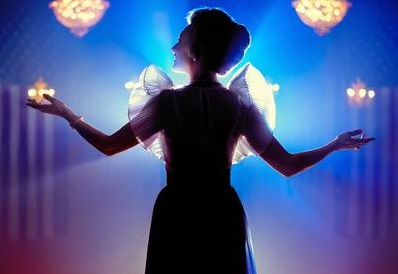The stunning Mrs. America just finished its 9-episode run on FX (and Hulu). It left me breathless, not only from its subject matter and how it was handled but also due to the performances from the entire ensemble—top to bottom. Emmys should be awarded to all involved and can we just all agree that Cate Blanchett (who also served as the limited series’ executive producer) deserves a Best Actress Emmy.
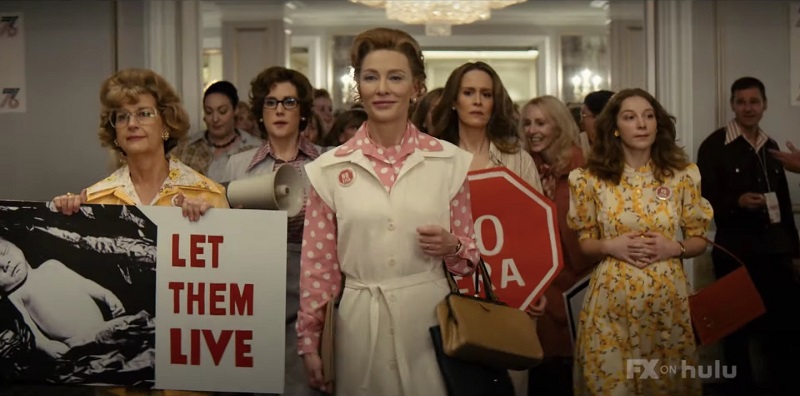
She’s not alone in the awesomeness. The episode prior to the conclusion illustrated why Sarah Paulson is one of the greatest gifts to acting with her command of her emotional toolbox. This entire series, her housewife/Stop ERA founding member has been a soul in search of a voice. Through her friendship with Phyllis Schlafly (Blanchett), she learned the power of politics and it may have taken eight episodes, but she finally discovered her inner strength. Her Alice Macray is a compilation of souls who worked with Phyliss as they pushed to stop the passage of the Equal Rights Amendment. It would also set the stage for the early rumblings of “attacks on the family” and so-called “family first” agenda that the right would embrace for years to come, sweeping all the way to the White House with the election of Ronald Reagan in 1980.
There isn’t a weak link in the entire ensemble … for example John Slattery could not have been better cast as Fred Schlafly, Phyllis’ legal eagle husband. Mrs. America embodies that classic saying that there are no small parts, only small actors. Hollywood powerhouse Elizabeth Banks is Republican Jill Ruckelshaus and her presence in this story illustrates that at the outset, the ERA fight was bi-partisan.
Uzo Aduba is otherworldly as Shirley Chisholm. Her character arc is powerful and will break your heart. She was a member of the House of Representatives and made history as the first woman of color to run for president, which she did in 1972. Although her presence is felt throughout the limited series, Mrs. America devotes an entire episode to her with the show’s third, appropriately called Shirley. There is an ensemble cast that may be one of the best on TV this entire year, but producers wisely decided that many of the nine episodes carry the moniker of a key player in this struggle. Episode 1 is Phyllis, while Episode 2 is Gloria (Steinem) and immediately we sense that the two fronts of this battle have their leaders and they are on a collision course … but it’s not that simple. The richness of this series lies in so many areas, but one comes from casting. As we stated above, Episode 3 followed the astounding Shirley and her run for president, but also her role in the feminist movement … right on through the final episode that gave us the impression that she just won what will prove to be her last re-election campaign for Congress. It’s a bittersweet moment as it occurs during the episode entitled Reagan. We all know how well the women’s movement did under that leader.
Margo Martindale wows again as her turn as the iconic Bella Abzug was revolutionary. One of the pillars of the female empowerment movement, Abzug served in Congress and ran for the Senate, but lost. She would get her own self-titled Ep in Episode 7 and over that and the following two broadcasts, it all comes to a head with Episode 8, Houston, and that final episode, Reagan. Martindale has been turning in great, groundbreaking performances for decades now. But there is something about the work she has achieved in the last decade that has been extraordinary. There are plenty of examples, but let’s just focus on what Martindale brings to Mrs. America. The thing about Abzug is that she, sadly, suffered from what has happened to many a woman over the years. She was labeled as difficult and a firebrand for stating things in a manner that was congruent to anything a man would say, but coming from a female, it gets labeled as “pushy” or “loudmouthed” or worse still, “she’s being a bitch.” She stepped on many toes, as many a leader has been known to do. Nobody accomplishes any kind of seismic change without breaking a few windows along the way. Yet, Abzug suffered for it. There’s even an explosive response to her and the other feminist movement when they meet then-President Jimmy Carter. Someone on Carter’s staff accused her of “yelling” at the leader of the free world. It would result in a shocking turn of events (all are true) that shows how the double standard for sparking change is different for men and women and for Abzug, it couldn’t have been more pronounced, even within her own movement. She and Steinem famously didn’t talk for a spell, and during a key moment during the movement!
See, that’s another reason why Mrs. America is such a gift to the world. We get to see all the goings-on, “warts and all” of these folks. Schlafly had the same issues herself. She was continually criticized by some saying that they believed she was out for name recognition first and stopping the ERA and starting the family first movement as a means to become more famous and even at one point, she believed she would be the first woman appointed to be on the president’s cabinet. There were countless folks in her own group who tried to be more to their side of the movement and was cut off at the knees by Schlafly. Most notably, Sarah Paulson’s Alice Macray would one-moment credit her pal with introducing her to politics when prior to her friendship with Phyliss, she never voted. When they had a difference of opinions, Macray would just keep her mouth shut rather than fear being vilified by the STOP ERA leader. Melanie Lynskey, best known for being the stalker next door in Two and a Half Men, does something outstanding with her turn as Schlafly’s associate Rosemary Thomson. It could easily be argued that if Phyliss stepped out of the way, Thomson would be the group’s leader. There are power plays on both sides, as is the case in any societal movement, and as filmmakers portray it in Hulu and FX’s latest stunner, it is showcased evenhandedly and more importantly, entertainingly enlightening.

Ari Graynor’s performance as former ACLU attorney Brenda Feigen-Fasteau is also a stunning achievement. The character showcased how a Harvard educated lawyer found herself in the middle of the feminist movement and through a series of anecdotes from her law school education, showed that even her professors had archaic opinions about a women’s place in the law! Then, in a striking moment, she reveals that when she and her husband announced they were expecting, she was fired. From the ACLU. For being pregnant. Yeah, that.
Her filmography is filled with a richness that embodies versatility, but what Rose Byrne achieved with her portrayal of Gloria Steinem is a revelation. Not only does she impeccably capture the cadence of the speech patterns, but her little ticks, such as how she tucked her long, highlighted hair into her trademark aviator glasses. Byrne scored the role of a lifetime and hit it out of the park, giving a layered turn to a character that the world probably knows better than any soul that orbits the Mrs. America world. One thing that emerged from this portrayal that I’d never realized before is that Steinem was pragmatic. She knew politics better than she gave herself credit for. Often, she would defer to Bella or someone else in the group, but in the end, her ideas, her theories, those were the ones that worked.
There was a great sacrifice by all who served on both sides of this issue. It is made clear that Phyliss went without seeing her children for long stretches. For Gloria, it was often said that she was married to the movement and therefore, her personal life was always playing second fiddle. There is a firm command of her gifts through every single role the Australian actress has tackled. Yet, what she does with Gloria is nothing short of a moving and endearing tribute to a cultural icon who the women of today owe much. Here’s a crazy idea … let’s green-light a biopic on the Ms. founder and have Byrne don those bellbottoms once again!
Like Abzug, feminist leader Betty Friedan (Tracey Ullman) rubbed people the wrong way—all for speaking her mind. Her 1963 book, The Feminine Mystique, is often credited with launching a so-called second wave of feminism. Those in the movement know they all owe her so much, but her abrasive manner and inability to see other sides of issues (including her thoughts on inclusion or exclusion of lesbian issues in the push for women’s rights) caused her serious issues. When they finally were able to hold a National Women’s Conference (chronicled in the Houston episode), Friedan was given an “at-large” delegate invite. She didn’t understand what that meant, but viewers did. It was a way of appeasing her, without getting her name plastered across all the material celebrating the historic event. As Ullman plays her, it is like looking in a historical mirror. She looks like her. She talks like her and most importantly, the British actress embodies all that drove the woman whose work for the cause—some would argue—cost her a chance at happiness in the personal relationships department.
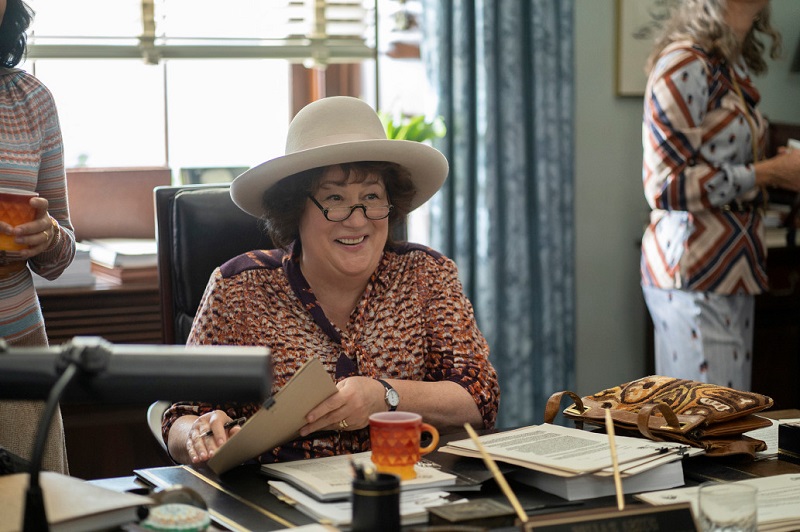
The music from Episode 1 through the final Episode 9, is sensational. The music supervisor outdid themselves and one had a feeling that would be a case when the cold open concluded for the pilot and the opening credits were accompanied by that smash hit disco-ized version of Beethoven’s Fifth Symphony. There are few opening credits sequences that nailed it as pricelessly as Mrs. America achieves in its just-over-a-minute intro. How the songs of the era are interwoven into the drama is a lesson in utilizing sonic succulence to push your emotive storytelling agenda. Prepare to head over to Spotify after that first episode and add the Mrs. America playlist to your repertoire.
Dahvi Waller created the limited series. She won an Emmy as a writer and producer on Mad Men and also serves as executive producer on Mrs. America. Her background as a playwright served her well in this capacity as she was able to bring the theatrical sensibilities of character development and ensemble intertwining in such a way that overtly enriched the entire limited series. I keep using the word, “gift,” but that is exactly what this entire series feels like to me. I treasured every moment and now have suffered greatly since it concluded because I wanted more. These characters were a part of my life for several weeks and even if I disagreed wholeheartedly with one side of this issue, I could completely appreciate their fully enriched personas as it was laid out by the show’s writers and captured by the actresses and filmmakers. Don’t be surprised if you find yourself re-visiting Mrs. America for a second go-around. It is rare that a limited television series calls for it. Blanchett, in her role as executive producer, has presented something to the world that is as important as anything she is likely to do with the rest of her career. As such, dive into Mrs. America, and return for round two, and perhaps even round three.
A collective of five directors collaborated to bring us the nine eps and what is fascinating is how many TV programs feel like the tone shifts when a helmer change is made. But with Mrs. America, this is about as seamless as can be achieved. This is further evidence of how every single individual checked their ego at the door, dove in, and told a story that is as important to every daughter as it is for our sons. This is a human rights issue that was so memorably captured in nine episodes that I cannot think of a single arena or moment that could have been better. It’s humanly impossible.
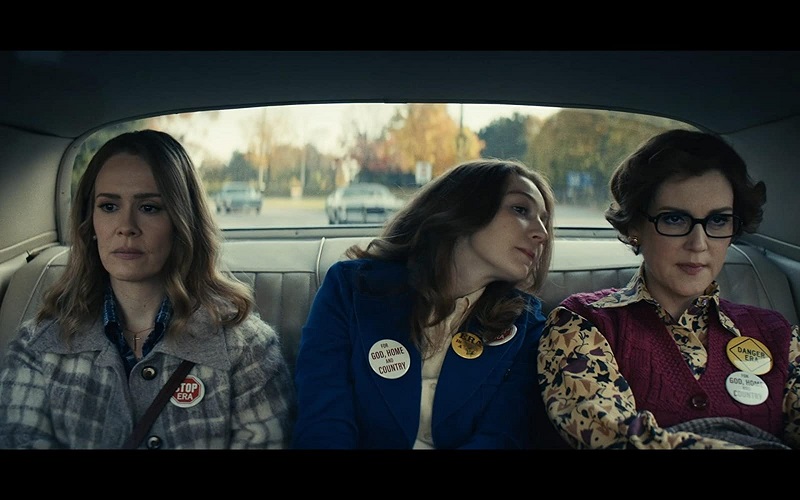
The seeds of the final episode are laid throughout, but those of us with a background in history or political science will see something coming and it isn’t pretty. The political landscape that cages us currently was firmly set in motion by the fight over the ERA, as portrayed in Mrs. America. It’s all there and as it starts to gain momentum—it haunts more effectively than any horror movie could. We are deeply divided as a country, on a myriad of issues that has many wondering how we could ever find our way back to being a country of Americans first, and individuals second. How we get there is not even broached in this limited series, nor should it be—that’s not what this is about. But, as the Reagan episode closed out the series and started to fade into memory, I can’t help but feel that many a movement has been hijacked on their way to present day.
Schlafly was an expert at half-truths (or alternative facts as they are being called now) and would hit those points over and over and over again until fear overtook rationality. That is the Republican playbook currently and some could argue, it has been for decades now. She openly admitted in many instances that she was taking words out of context, but at the end of the day, Phyliss felt that, for example, “Bella said those words, just not in that order.” Instead of hitting their talking points for that week, the feminist movement would have to spend days on end discrediting what Schlafly said about them and misconstruing their stands on the issues. In no way was the ERA going to ensure that women would be on the front lines of war, but Schlafly insisted that would be the law. It’s hard to make your points about the issue when all of your time is spent responding to falsehoods that are presented as facts. It worked wonders in the fight against the ERA, and it has been working wonders for Republicans ever since. It’s sad. Because as Banks’ presence shows (she gets the spotlight on Episode 6, Jill), the fight for the ERA was bipartisan. It was a slam dunk. She was a Republican powerhouse and worked right alongside Steinem and Abzug to push for rights that work for all women, not just Democrats or Republicans.
One would be hard-pressed to find that kind of bipartisan shared passion on anything. Heck, even tackling a pandemic has broken down along political party lines. Experts say, “wear a mask,” and the response on whether that is important or not firmly comes down along an elephant or donkey divide.
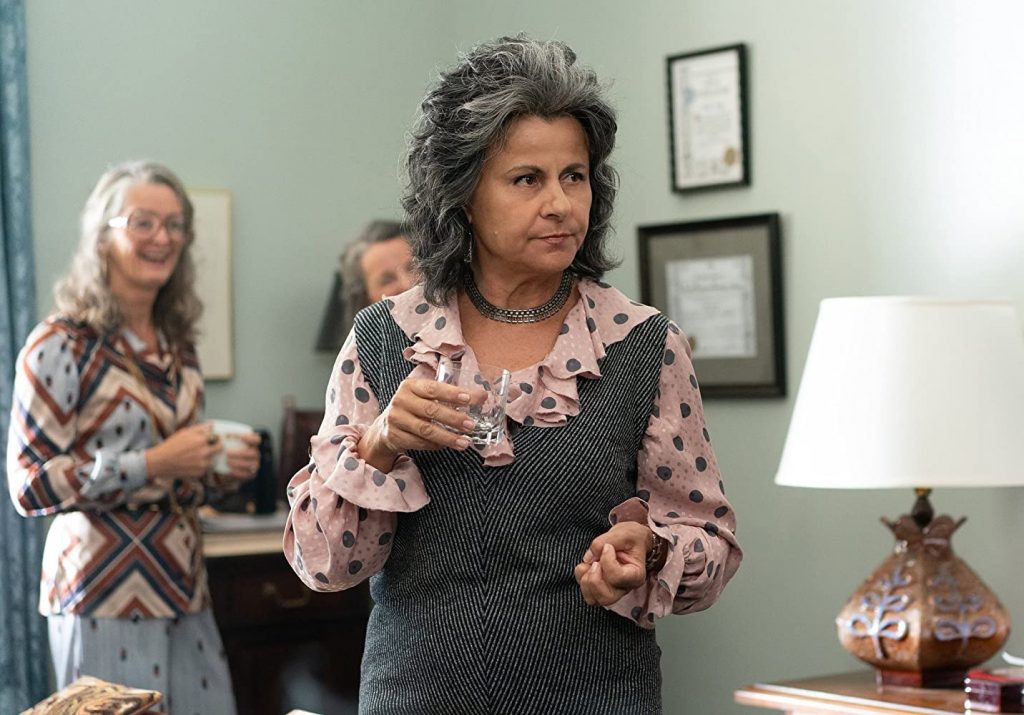
In the end, Mrs. America is a slice of American history that could not have been better captured. All involved raised the bar for depicting a movement, an era, and its exponentially explosive impact on the lives of all Americans.
The show closes on a quote by Steinem, and it is as fitting today as it was when she said it. “I have stood beside the greatest women of my generation. Still, today, we select our leaders by eliminating women and minorities and those with too little education. Changing this will take an exceptionally long time. After all, we are dealing with 10,000 years of patriarchy and racism. But we must continue to move forward in waves. What will keep us going is the revelation of what we can be. What the people around us can be without the crippling walls and prisons in which we have been forced. We are just beginning to discover, each of us, who we can be and no matter how long this revolution may take, there can be no turning back.”
Grade: A+

